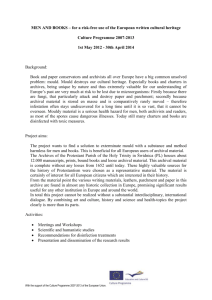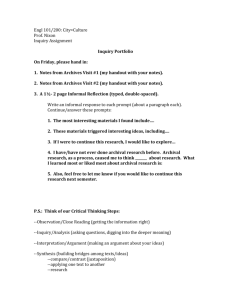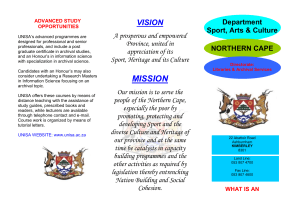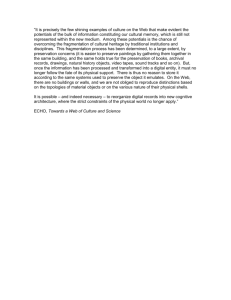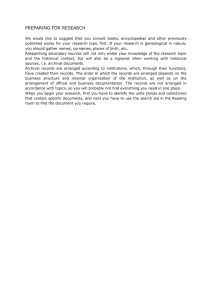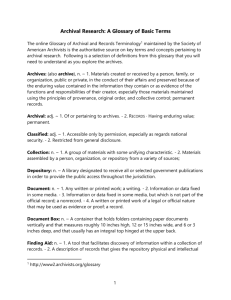The Present - UNC School of Information and Library Science
advertisement
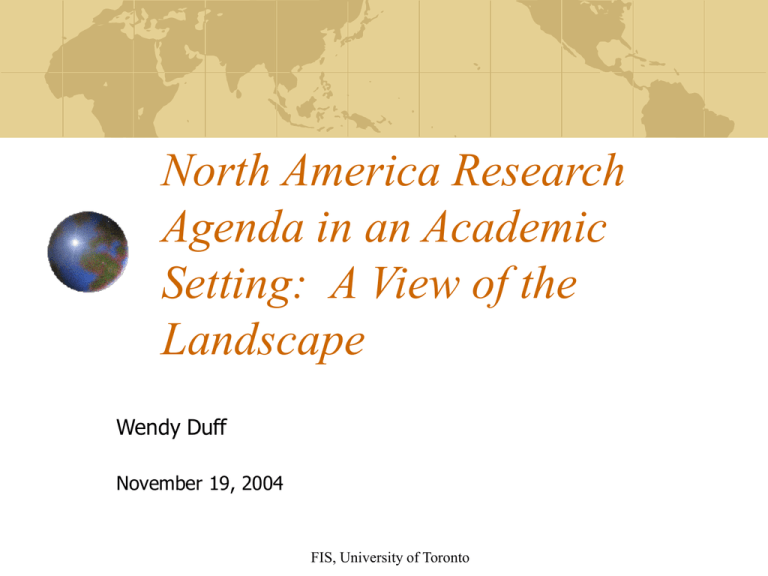
North America Research Agenda in an Academic Setting: A View of the Landscape Wendy Duff November 19, 2004 FIS, University of Toronto The Agenda The past The present Trends The challenges Research framework Why should practitioners care? Disclaimer Not comprehensive Research being conducted by archival researchers, PhD students and archival institutions No attempt to cover related research, e.g. metadata, records management, knowledge management I am an academic and my thoughts and conclusions are influenced by that viewpoint The Past Most research historical Archivists not trained in social science methods Calls for research and some research agendas set – little research The Present Historical History of the National Archives of Canada – detailed case study analysis of the formation of national identity and memory; the nature of cultural politics; the history-archives relationship, archival choices; and cross-fertilization being influenced by societal, intellectual, bureaucratic an organizational trends and theories. Evolution of archival theory (Terry Cook, U of Manitoba) “Twenty-five people who shook the world” development of descriptive standards in the United States (Susan Davis, U of Maryland)” Functions -Appraisal Survey of Canadian Archivists – to reveal the anatomy of Canadian archivists’ experience in doing appraisal (Barbara Craig, U of Toronto) Case study of appraisal in a feminist archives (Thea Miller, PhD student, U of T) Study of appraisal. (Tom Nesmith, U of Manitoba) Comparative Study on National Appraisal Strategy (Jennifer Marshall, PhD student, Pittsburgh) Description “Archival Description and the Apparatus of Authenticity”. Historical origins and theoretical foundation of the relationship; analysis of descriptive instruments, impact of current trends in theory and methodology; and identify strengths and weaknesses of current practice (Heather McNeil, UBC) – The content note in national and international descriptive standards and content analysis of existing content notes (Marcel Caya, UQAM) – Implementation of EAD in the U.S. (Beth Yakel, U of Michigan). Education Information technology and policy curricula (Anne Gilliland-Swetland, UCLA) Archival education in North American history departments and library schools (Elizabeth Yakel U. Michigan and Jeannette Bastian, Simmons) ACENSUS (Society of American Archivists) "Evaluating master's programs in information studies“ (Wendy Duff, Joan Cherry and Nalini Singh, U of Toronto) – Multi-year, and hopefully involving several educational institutions Preservation Evaluation of the Canadian Council of Archives’ preservation program. (Helene Carbonneau PhD student, U of T) – Electronic records NARA • Persistent Object Preservation • Presidential Electronic Records Pilot Operations System (PERPOS) – Georgia Institute of Technology – design software tools to support accession, preservation, arrangement, review and description • Distributed Object Computation Testbed (DOCT) infrastructure to test advanced technologies for preservation of electronic records Preservation: Electronic Records Margaret Hedstrom (U. of Michigan) Documenting the History of Internet 2. CAMiLEON Evaluation of NARA's Access to Archival Databases. Proposed - Incentives for data producers to create "archive-ready" data sets. The desktop of researchers and administrators (Helen Tibbo, U of Preservation: Electronic Records “Virtual Remote Control” (Cornell University) “a methodology and compilation of tools for monitoring and identifying potential risks of loss of Web-based information.” InterPares II – (UBC, LAC, NARA,UCLA,+ ..) “develop a theoretical understanding of the records generated by interactive, dynamic, and experimental systems and potential use in scientific, government and artistic sectors” Access User-based assessment of EAD finding aids (Elizabeth Yakel, U. of Michigan) Expertise in archival reference service (Wendy Duff, U of Toronto) Ax-snet (Wendy Duff, Toronto, Beth Yakel, Michigan, Helen Tibbo, North Carolina… and practitioners and institutions) • Generic user-based evaluation tools – improve services and systems and evaluate impact of archival services Access Development of user-based evaluation tools (Wendy Duff, Joan Cherry, - Jean Dryden, research assistant) (U of Toronto) The searching skills and know-how of reference archivists (Denise Anthony – U. of Michigan) Information seeking behaviour of historians (Helen Tibbo, U. of North Carolina) Why – measure impact, make the case to your funding body that you are effective, improve systems and services Mellon grant to hold a three day meeting of researchers and practitioners Literature review and environmental scan of current data collecting methods Meeting began with 5 papers to set the scene Publish papers presented at the meeting How it might work Modular – descriptions, exhibits, reference, education Criteria for evaluating systems and services – practitioners and researchers Identify methodology – who, when, how we evaluate – practitioners and researchers Develop research instruments and guidelines– researchers Test research instruments – practitioners Revise research instruments – researchers Use research instruments – practitioners Data added to research database – researchers – will be able to compare across institutions and also across time Develop guidelines for designing interfaces, etc Doctoral Work Policies for the management of electronic records (Lisa Daulby – PhD student – U of T) Copyright (Jean Dryden, PhD student – U of T) Notions of "archives as ritual," modernism and postmodernism as they relate to the post-colonial South Pacific (and the Cook Islands in particular) (Melissa Taitano – PhD student- UCLA) Language preservation project among one local native American community (Ruth Bayhylle - UCLA) PhD research How children are socialised into recordkeeping (Ciaran Trace – PhD thesis, UCLA) The development and adoption of the Reference Model for an Open Archival Information System (OAIS) (Christopher Lee – U. of Michigan) The adoption of IT in order to improve access to archival materials, and the factors that help or hinder (Jihyun Kim - U of Michigan) Trends Research has increased over the last 10- years Research to understand and improve current practice – appraisal, description and reference Research to understand impact of our current practice on creators and/or users Research to understand our past, and to identify factors that influence theory, standards, and practice Trends Interesting PhD research Development of technological solutions (especially for electronic records), practical tools and guidelines (involving institutions and practitioners) Collaboration - multi-institutional studies, research across domains Networks Involving academic researchers, practitioners and institutions InterPares - International Ax-snet – Currently North American but hopefully evolving to include other countries The challenges Researchers involved in numerous often unrelated research areas – spread too thin One oft projects in isolation do not necessarily build knowledge Large monolithic projects draw in a massive resources but can answer larger question. Need both large and small projects, which use different methodologies and from different points of view. Need to listen to the different voices Researchers and practitioners – different goals and objectives Archival researchers Conduct original research; work on interesting questions; based on a conceptual framework; add to the body of knowledge; discover something new; get published. Sometimes ideas proven wrong – this is acceptable. Research findings do not need to result in practical solutions. Archival practitioners Practical solutions, cost-effective, efficient methods. Improve practice. Interest in the past, want discover something new, perhaps wish to publish. Challenges If we focus only on immediate problems will not lay the ground work needed to answer larger questions If we only address theoretical questions research not seen as useful Challenges Research takes time. Time to conduct the research but even more time to analyze the data and discover the trends. Funds. Difficult to come by in sufficient amounts. Challenges Interdisciplinary research necessary for electronic records research but difficult to work on interdisciplinary teams Research framework “a research framework can provide the structure for a series of smaller, practical projects that build on each other’s results, contribute to an understanding of broader issues, and yield cumulative results from what might otherwise be disparate efforts.”[1] [1] Margaret Hedstrom, “Understanding Electronic Incunabula” A Framework for Research on Electronic Records,” American Archivists 54(Summer 1991): 339. Why should practitioners conduct research? Measure impact, improve services etc. Solutions to electronic records problems Understand what works and what does not Understand our theories, our practice, our profession, our institutions, and ourselves Why? Its fun!!!
